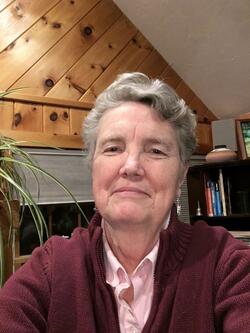Anchored in the Storm: Three keys to spiritual leadership in times of chaos - A #TrusteeTuesday reflection
 By Nancy Nienhuis
By Nancy NienhuisSeveral years ago, I had the opportunity to meet with all of the directors of the Centers on Ministry across the United States at their annual meeting. Psychologists in these centers work with pastors who commit unethical actions, as well as pastors who are burned out and thinking of quitting, and they provide a thorough series of psychological and emotional tests for seminarians to look for fitness for ministry. These tests are an important part of faith leaders’ paths into ministry, and something seminarians spend weeks preparing for. There was a great deal of wisdom in that room, and over 100 years of experience. The directors concurred that those who did well in ministry without burning out or acting in ways that jeopardized their standing shared two key characteristics. First, they were deeply grounded in their faith. Second, they knew their own limitations and thus did not take on tasks that would put them in over their heads. Instead they would ask for help or turn down a request.
I believe these qualities, so important for faith leaders now, will become all the more important in the aftermath of COVID-19. I would also add a third quality: being able to rest well. I don’t mean resting in sleep, although good sleep is important, but being able to carve out times of quiet and peacefulness in the midst of any storm.
Being grounded in one’s faith is critical during times when those around you are questioning theirs. “Why is God doing this to us? It’s so unfair that my spouse died of COVID-19!” Without firm grounding, faith leaders may not be able to understand monumental crises like COVID-19 without resorting to an immature faith that believes God or the universe is playing a human chessboard, tossing off pawns with malice.
Similarly, asking for help separates out those who survive and thrive from those who do not. Novices and narcissists think they can (or should) go it alone, never asking for help regardless of the intensity of the storm and how much they are floundering. I recall how Rev. Matthew Crebin (MDiv ’94) described actions he took with others in the wake of the 2012 shooting at Sandy Hook Elementary School. His church became a central hub of the response, but only because he worked with local interfaith leaders as well as parents, school officials, and first responders. They were able to meet multiple critical needs simultaneously; none could have done alone what they accomplished together.
Finally, faith leaders must be able to find moments of peace in the midst of the biggest challenges, something they will be able to do only if nurturing mindfulness is already part of their daily routine. As Wendell Berry advises, one must “go into the peace of wild things,” or at least away from the chaos that surrounds one, to be useful when cares feel overwhelming. These are the still, small places where you have a chance to hear God’s voice or understand what the universe is requiring of you. These are the places where deep inner peace, contemplative prayer, and mindfulness reside. What I appreciate about Andover Newton is the school’s intentional fostering of nimble faith leaders who are firmly grounded in their faith traditions, and are nurtured in a program where the value of community and reaching out across lines that could divide are key to the non-classroom curriculum. Toss in the ability to find rest for the soul in turbulent or quiet times and you have the faith leaders we need both now and in the aftermath of COVID-19.
For an explanation of this weekly series, see the announcement on our news feed.
To learn more about our trustees, visit the Trustee page on this site, where you will also find a full bio for Nancy Nienhuis.
